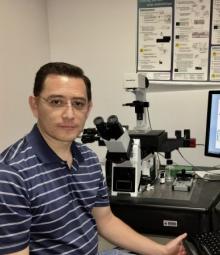Juan Carlos Rivera-Mulia
Juan Carlos Rivera-Mulia is an Assistant Professor in the Department of Biochemistry, Molecular Biology and Biophysics (BMBB) of the University of Minnesota Medical School. He earned his B.S. from the Autonomous University of the State of Mexico and Ph.D. from the National Autonomous University of Mexico. He completed his postdoctoral research training in the laboratory of David M. Gilbert at Florida State University. His research uses multiple genomic technologies as well as computational approaches to construct integrative models of nuclear function. Research in the Rivera-Mulia lab also exploits human embryonic stem cells (hESCs) and optimized differentiation systems to model development and induced pluripotent stem cells (iPSCs) derived from patients to model disease alterations.
Research:
DNA Replication Timing and Nuclear Architecture
The human genome is organized in functional compartments that align with the temporal order of DNA replication (Replication Timing). This 3D genome organization is a key factor of gene regulation and its alterations are associated to disease. Research in the Rivera-Mulia lab focusses in understanding the mechanisms that control DNA replication timing, how large-scale chromosome organization is regulated, maintained in distinct cell types and remodeled during development as well as how alterations in nuclear architecture disrupt gene function in human disease. To address these questions, we exploit genome-wide characterization of nuclear architecture, replication timing and gene expression as well as computational approaches to construct integrative models of nuclear function.
In our lab, we exploit human embryonic stem cells (hESCs) and induced pluripotent stem cells (iPSCs) combined with optimized differentiation systems to model development and track the changes in RT, gene expression and 3D genome organization. In addition, we exploit multiple bioinformatic approaches to identify signatures that distinguish developmental alterations in human disease.
